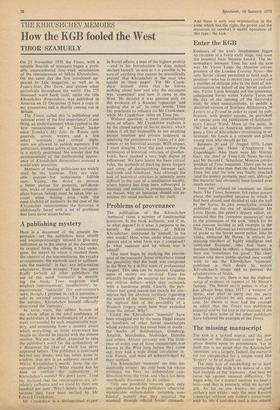THE KHRUSHCHEV MEMOIRS
How the KGB fooled the West
TIBOR SZAMUELY
On 23 November 1970 the Times, with a suitable flourish of trumpets began a prob- ably unprecedented four-week serialisation of the reminiscences of Nikita Khrushchev. On the same day the first instalment ap- peared in Life magazine, as well as in France-Soir, Der Stern, and sixteen other periodicals throughout the world. The 275 thousand word book itself, under the title Khrushchev Remembers, was published in America on 21 December (1 have a copy in my possession) and is shortly coming out in Britain.
The Times, called this 'a publishing and political event of the first importance'; if any thing, an understatement when applied to the first reminiscences of a Soviet leader since Trotsky's My Life. In Russia only generals, actors, writers and a few select scientists and retired diplo- mats are allowed to publish memoirs. For politicians, whether active or not, such activi- ty is strictly prohibited. No wonder that the announcement of the forthcoming appear- ance of Khrushchev Remembers aroused a world-wide sensation.
Memoirs of leading politicians are widely used by the historian. They are valu- able sources—but notoriously fallible ones. Vanity, the desire to present a better picture for posterity, self-decep- tion, tricks of memory: all these common- place human failings must be taken into ac- count when dealing even with the most truthful of memoirs. In the case of the Khrushchev reminiscences the historian is additionally faced with a set of problems that have never arisen before.










































 Previous page
Previous page